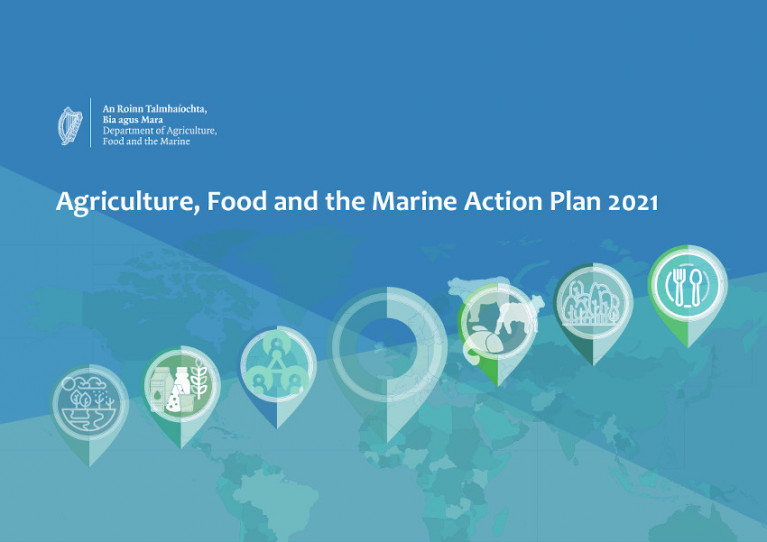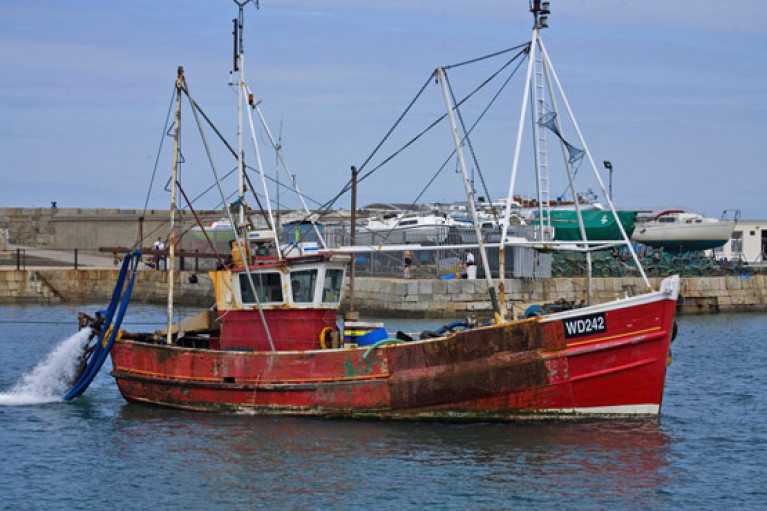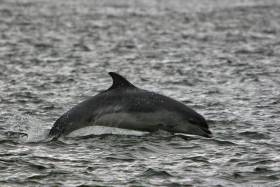Displaying items by tag: DAFM
New Registrar General of Fishing Boats Is Appointed
Marine Minister Charlie McConalogue has appointed Roni Hawe as Registrar General of Fishing Boats with effect from 1 September 2021.
Previously principal of the Sea Fisheries Administration, Hawe succeeds Kevin Moriarty as the licensing authority for sea fishing boats in the Department of Agriculture, Food and the Marine.
She is seconded in the role by Deirdre Kelleher, who was appointed as Deputy Registrar General of Fishing Boats with effect from 1 June 2014.
‘Fragile’ Market for Irish Seafood at Home and Abroad in Pandemic-Hit 2020 - DAFM Report
The Irish fisheries market both at home and abroad experienced an “extremely fragile” situation in the wake of the COVID-19 pandemic, according to the latest Annual Review and Outlook for Agriculture, Food and the Marine.
Published today (Wednesday 10 November) by the Department of Agriculture, Food and the Marine, the report details that exports from a sector that employs 16,400 people “directly and downstream” totalled €531 million in 2020 — down nearly 8% on 2019.
“The sector has been severely impacted by COVID-19 which has affected the performance of all species across the sector, particularly within the shellfish category which suffered a 30% reduction in export values,” it said.
France — which is Ireland’s largest export market for seafood, accounting for 11% of exports in 2020 — was “extremely challenging for Irish exporters” last year, with values declining by almost one fifth, or €118 million — driven largely by pandemic-enforced closures across the hospitality sector. A similar depression was experienced across the other main EU markets of Spain, Italy, Germany and Poland.
Exports to Asia also “suffered major declines” last year, with exports of €46 million representing a 48% decline on 2019. Exports to China in particular fell by whopping 70%, and a rise in logistical costs also had a “negative impact” on returns.
It was a bad year for the Irish oyster sector, too, with export value (-30%) and volume (-29%) both down significantly. The only growth was experienced in exports to South Korea and Italy; however these markets “are relatively small”, the report notes.
Salmon exports told a brighter story in 2020, with values rising by 14% with an 11% growth in volume. Poland has now overtaken France as the largest market for Irish salmon, with exports almost doubling, while exports to Germany rose by 10%.
Regarding post-Brexit changes to Ireland’s quota share under the Common Fisheries Policy, the report outlines how quota balancing is being implemented on a phased basis. Pelagic stocks were quota balanced for the years 2018 and 2019, while balancing for the five key demersal (whitefish) stocks was implemented in 2020.
“At this point, it is not clear how the United Kingdom’s withdrawal from the EU will be effectively managed from a fisheries perspective,” the report warns.
Despite the difficulties experienced during the first year of the COVID-19 pandemic, however, Ireland’s fishing industry “has continued to keep food in our shops and on our tables during this extraordinary time”.
The report adds: “This has highlighted the vital role that the fishing industry plays in the food chain. This, in turn, underscores the importance of ensuring the sustainability of our fish stocks.”
Further details — including more detailed breakdowns of seafood exports by category, shellfish licensing and a briefing on the Clean Ocean Initiative — can be found in the Annual Review and Outlook for Agriculture, Food and the Marine which is available to download from Gov.ie HERE.
Marine Minister Charlie McConalogue has today (Wednesday 14 April) published the Department of Agriculture, Food and the Marine Statement of Strategy 2021-2024 alongside an Action Plan for 2021, which outlines 75 actions to further develop a sustainable, innovative and competitive agri-food, forestry and seafood sector.
The Action Plan for 2021 builds on work already undertaken by the minister, his predecessors and the department, including continuing to provide vital supports to those in fishing who are part of “the lifeblood of a balanced rural and coastal economy and community”.
Welcoming the publication, Minister McConalogue said: “The key priority for me as minister is the protection of incomes and the sustainable development of our sector.
“Our farmers, fishers and food producers face many challenges as they continue to provide the high-quality food, fish, timber. Our primary producers also excel at supporting a range of ecosystems services, while playing a central role in the transformation of our economy and society towards a long-term sustainable future.
“We will provide a policy platform that protects incomes, ensures that our food offering is safe and of the highest quality and that our industry is environmentally sustainable and competitive.”
The Statement of Strategy sets out five strategic goals which will be underpinned by actions to reduce greenhouse gas emissions, improve water and air quality and reverse biodiversity decline to give effect to the Programme for Government commitment to make climate action a core pillar of Department strategies.
Among these goals is an effort to “deliver a sustainable, competitive and innovative seafood sector, driven by a skilled workforce, delivering value added products in line with consumer demand”.
The Department of Agriculture, Food and the Marine Action Plan 2021 and the department’s Statement of Strategy 2021-2024 are available on Gov.ie HERE.
Review Shows Irish Fishing Industry Buoyed By Exports But Brexit & COVID-19 Cast A Shadow
The Department of Agriculture, Food and the Marine’s latest Annual Review and Outlook for the fisheries sector is a generally positive one — though tempered by the challenges of Brexit and the coronavirus.
Published today, Thursday 8 October, the review cites CSO figures for 2019 which put the value of Irish seafood exports at €577 million with increases in the value of both salmon and mackerel, Ireland’s most valuable export catches.
Mackerel’s 7% value increase was particularly remarkable as it came despite an 8% drop in volume, following a reduction of the quota by one fifth — thanks in part to a bullish market in Asia.
Shellfish exports had a challenging year in 2019, however, with volumes and values down significantly in the oyster sector.
The coronavirus pandemic has seen similar challenges experienced across the fisheries and aquaculture sectors over the course of 2020 thus far.
“Nonetheless, in spite of the difficulties, the fishing industry has continued to keep food in our shops and on our tables during this extraordinary time,” the report says.
“This has highlighted the vital role that the fishing industry plays in the food chain. This, in turn, underscores the importance of ensuring the sustainability of our fish stocks.
“Due to the closure of the food service sector around the world during the pandemic and transportation issues, exports of fish from Ireland were down around 20% in value during the first four months of 2020.”
Meanwhile, Brexit remains a serious concern, with fears that more than 70% of the Irish fishing fleet could lose access to their regular grounds in UK waters in the absence of a deal on fisheries.
The report outlines: “The UK demand is that quota shares are established on the basis of ‘zonal attachment’ and each year access to the UK fishing grounds are ‘purchased’ using the transfer of EU quota to the UK as recompense for this access.
“If the UK zonal attachment demand was applied, it would have huge negative consequences on Irish fisheries because the UK could claim a much higher proportion of the available fishing quotas for each stock each year.”
It continues: “The UK ‘zonal attachment’ claim is based on the level of catches taken from UK waters. If this criterion was used, it would result in Irish fish quotas being cut by 35% in value.
“The displacement of the EU fleet from the Irish exclusive economic zone (EEZ) and/or the reduction in EU quota shares, if remedial measures are not taken, is likely to lead to serious over-exploitation of stocks in our own EEZ; deliver substantial cuts to many of our quotas; [and] cause a substantial control challenge for the Irish navy, and potentially conflict at sea.”
The report also comes on the same day that the High Court struck down the ban on larger vessels fishing within Ireland's six-mile nautical limit, as reported earlier on Afloat.ie, which could have significant conseqences for Ireland's inshore fishing fleet.
The department’s 2020 review and outlook for fisheries and aquaculture can be found attached below, and the full review is available from the DAFM website HERE.
Marine Wildlife Groups Share In €2.5M Funding For Animal Welfare
#MarineWildlife - Four marine wildlife organisations will share in €2.56 million in funding for animal welfare throughout the State, as announced yesterday by Marine Minister Michael Creed.
Seal Rescue Ireland in Courtown, Co Wexford receives €12,000 for its efforts in rehabilitating seals and other marine wildlife, as well as providing training for rescuers across the country.
In other awards, Galway & Claddagh Swan Rescue in Barna has been allocated €5,000, while the Irish Whale and Dolphin Group receives €3,000, and the Oiled Wildlife Response Network, based at Shannon Foynes Port, will get €1,000.
“These bodies provide a great service to the community in their work in safeguarding animals,” said Minister Creed of the awards for 111 animal welfare groups.
“Many of today’s recipients provide facilities for neglected animals that sadly in a large number of instances have been abandoned by irresponsible owners, and the increased funding being awarded is evidence of my department’s ongoing commitment in protecting animal welfare and a recognition of the important role played by the many organisations throughout the country in safeguarding animals, particularly pet and companion animals.”


























































